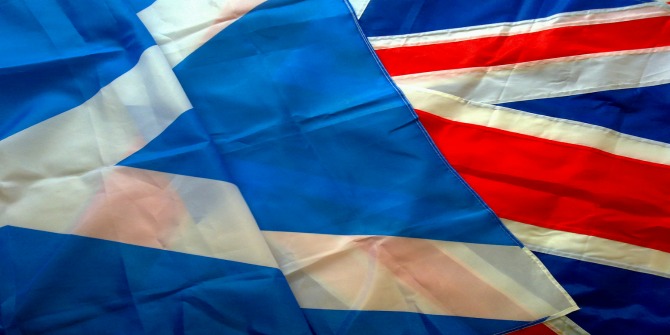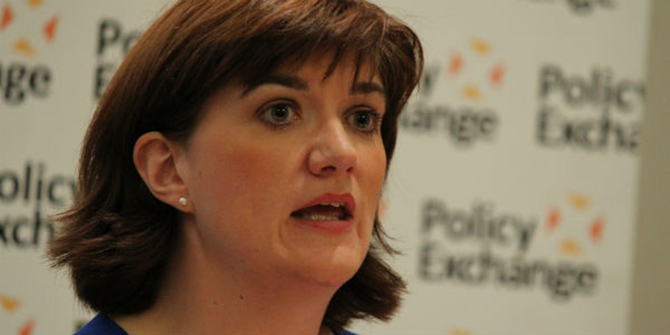 The question of Scottish independence has taken centre stage in the public debate since the Brexit vote. England and Wales have voted to leave the EU, but Scotland and Northern Ireland have voted to remain. Together with this differing outcome, the absence of a post-referendum plan – and of any sign of leadership – on the part of the UK government create a favourable climate for the SNP. But what does it all mean for those campaigning for Scottish independence? Craig McAngus explains.
The question of Scottish independence has taken centre stage in the public debate since the Brexit vote. England and Wales have voted to leave the EU, but Scotland and Northern Ireland have voted to remain. Together with this differing outcome, the absence of a post-referendum plan – and of any sign of leadership – on the part of the UK government create a favourable climate for the SNP. But what does it all mean for those campaigning for Scottish independence? Craig McAngus explains.
The decision by the UK electorate to leave the European Union has resulted in unprecedented levels of political, economic and constitutional uncertainty. The UK’s future relationship with the EU is still an unknown quantity, and the leadership vacuum at the heart of the British state means that this unknown has not been abated. The UK’s territorial integrity is also under question, with the sceptre of Scottish independence rearing its head again.
The 2014 Scottish independence referendum, returning a majority of 55 per cent, was a more convincing result than that of the EU referendum and, in the main, was considered as having put the issue of independence to bed – for the time being. Circumstances have undoubtedly changed, however. The SNP’s 2016 Scottish election manifesto stated that a material change in circumstances, such as Scotland voting Remain whilst the overall result was Leave, would act as the basis for another independence referendum. Nicola Sturgeon has stated in the last few days that a fresh referendum on independence is very likely.
However, the SNP will not want to commit to a second referendum if they don’t think it can be won. There have been a few polls since the EU referendum result which show a boost in support for independence but we will need to see if this develops into a pattern that holds over the next few months. If support does hold, then we could see a referendum happen before negotiations between the UK government and the EU conclude at the end of the Article 50 window, whenever that might actually be.
Uncertainty and risk transferred
Scottish independence this time around is still fraught with uncertainty. Currency remains a crucial and unknown issue, as does the future health of an independent Scotland’s fiscal position. The collapse in the price of oil has impacted heavily on the tax take from the North Sea and the fiscal transfer through the Barnett Formula is currently supporting Scottish revenues and, by extension, spending on public services. An independent Scotland would have some serious decisions on taxation and expenditure to make in the short-term, given that it was forecast to have a fiscal deficit of 7.8 per cent of GDP in 2014/15.
Indeed, the main reasons why the last Scottish independence referendum returned a No vote was because the electorate judged that the Scottish economy would suffer if there was a Yes vote, and that there was not sufficient clarity around the question of what currency Scotland would adopt on independence. Despite Brexit, these questions still remain.
At the same time however, Brexit has changed everything: whereas the option of Scottish independence was the risky option that would spell uncertainty and sustained economic turmoil, the previously ‘safe’ option of the UK has now become equally, if not more, risky. The result of the EU referendum has opened up a pandora’s box of uncertainty with a sharp drop in sterling, chaos in the stock market, and the demotion of the UK from its position as the 5th largest economy in the world.
The SNP has therefore been handed a favourable strategic position. No longer is the UK the safe and consistent option that was posited by the pro-UK campaign during the first independence referendum, but has now become the embodiment of the chaos that the pro-independence campaign was accused of wishing to bring upon Scotland and the UK. Arguably, the situation the UK now finds itself in is worse than would have befallen it if Scotland had voted Yes in September 2014, given that the global impact Brexit has had. Sure, Scottish independence would have had an impact globally, but not to the same extent that we are currently seeing.
Furthermore, Nicola Sturgeon has been the epitome of leadership in the absence of anything resembling the equivalent from London. The Chancellor disappeared for days, the Prime Minister is now a lame duck, and the Parliamentary Labour Party is tearing itself apart through a spate of resignations from the Shadow Cabinet and a challenge to Jeremy Corbyn’s leadership. The SNP has been electorally successful in Scotland because it is seen as a competent government with capable and trustworthy leaders. The events over the past few days will have done no harm to these attributes in the eyes of the public and will only help her already strong credibility during a new campaign for independence.
The pro-UK campaign
The last independence referendum saw a pretty clear demarcation between the pro-independence SNP and the major statewide political parties. The majority of what would normally be termed as the ‘establishment’ – namely big business, financial institutions and newspapers – was firmly against independence. The pro-UK parties articulated the position of these groups and argued that independence would impact negatively on ordinary voters. This time around may prove to be somewhat different. We have already seen support from Scottish Labour and the Scottish Liberal Democrats for Nicola Sturgeon’s strategy of negotiating with the EU directly in order to ascertain Scotland’s options going forward.
Furthermore, some high-profile Scottish Labour figures have come out publicly and said that they are now very sympathetic to the idea of Scottish independence. Time will tell if more of the unionist establishment break ranks and put their weight behind an independent Scotland. One would expect that many are, for now, waiting to see how things develop over the coming weeks. However, it is not outside the realms of possibility that some major financial institutions and multinational companies see an independent Scotland in the EU a more attractive prospect than a UK outside of the EU.
Another key question for those advocating the continuation of the Anglo-Scottish union is this: who will lead such a campaign? Back in 2012, it was decided that it was best for a Labour figure to lead the campaign, backed up by financial support from the Conservative party. We must not forget that in 2012, Labour had 41 Scottish MPs and, although doing badly at the 2011 Scottish election, was still the second largest party in the Scottish Parliament. The party now has one Scottish MP and has less MSPs (24) than the Scottish Conservatives (31). Scottish Labour does not at the moment have the resources, the credibility or the public support to lead an effective pro-UK campaign.
The 2016 Scottish election showed that the Scottish electorate has become increasingly polarised between unionists and nationalists, and the unionists have increasingly turned towards the Scottish Conservatives to champion their pro-UK views. However, any sign of a pro-UK campaign headed up by a Conservative would risk decimating what’s left of Scottish Labour’s working class vote and probably push those who voted No last time towards independence.
Previously, the UK government could put its resources and efforts behind winning a No vote. This time around, they would have to fight a battle on two fronts as Brexit negotiations get underway. The UK government would have no choice but put the Brexit negotiations at the top of the priority list. The potential opposition that the SNP faces is therefore in a far weaker position than it was in the run-up to the first independence referendum. At the same time, the SNP itself is bolstered by over 100,000 members and a wider pro-independence movement that, although separate and independent from the SNP, will campaign for the same outcome and facilitate engagement with communities and individuals who are perhaps still sceptical of the SNP.
An EU deal may be key
Despite a favourable climate for the SNP and the wider pro-independence movement, winning a Yes vote will still be a difficult task. Doubts about independence will still be strong amongst those who need to be won over. These doubts will also be framed in the context of where the UK-EU relationship is heading. If, for example, the UK ends up negotiating a Norway-type deal whereby the UK officially leaves the EU but is still part of the European Economic Area, then the costs of Scotland remaining part of the UK are significantly reduced. If, however, the arrangement is much looser, the costs of remaining in the UK are amplified and the benefits of remaining a member state of the EU will likely carry more weight.
Nicola Sturgeon has made overtures towards the EU and member states. Her strategy is to highlight Scotland’s commitment to the European project and gain allies who will support Scotland’s bid to become independent. This may well prove important if a referendum is held that the UK government refuses to recognise. However, if the UK is able to begin constructive negotiations with the EU, then there is a possibility that it could ask for a partial cessation of dialogue with Scotland in return for amiability around the terms of a potential deal. The UK government also knows that, despite the rhetoric from Europe, key member states such as Germany have an intrinsic interest in maintaining close economic and political ties. Whether or not the UK can produce the leadership to promote and protect its territorial integrity is still an open question, and the early signs are that this may be unlikely.
____
 Craig McAngus is Lecturer in Politics at the University of Aberdeen.
Craig McAngus is Lecturer in Politics at the University of Aberdeen.









There are many similarities between the EU referendum and the Scottish Independence referendum in terms of the reasons people voted “out”, e.g. national pride, a desire for greater democracy, giving the establishment a good kicking, and varying degrees of xenophobia (and anyone who thinks that xenophobia wasn’t a factor in the Scottish Independence referendum clearly wasn’t reading social media). Naturally, the SNP is seeking to frame its aims in terms of an “outward-looking pro-European” agenda; but in truth this is pretty much equivalent to the Brexiteer’s attempting to frame their aims in terms of “an outward-looking global” agenda. When stripped of its veneer, the SNP’s claims to moral superiority rest entirely upon their belief that progressive left-wing politics are inherently superior to the free-market politics of the centre-right; a claim that Scottish Independence would surely test to destruction.
A couple of points.
Nobody is certain at this moment the number of SNP members. The last statement from SNP sources on Sunday was that another 15,000 new members had joined. That figure may have been from Saturday so by today Monday there may be an additional 20,000 new members. To put this in context more than a year ago estimates for real Labour Party members in Scotland was possibly 7,000. Labour had the habit of also adding on people who had Labour Social Club memberships to inflate any numbers they reported to the press. But by checking their financial statements it was possible o calculate how many fee paying political members existed. So just the new members of the SNP in the last couple of days is more than the combined membership of Labour, Scottish Conservatives and LibDems.
Second point, the German newspaper most read by the financial industry in Germany and close to Angela Merkle’s CDU party reported that the head of the CDU group in the EU parliament was forming a campaign group call Scotland in Europe to seek a firm commitment to a Scottish membership. He is also head of one of the Parliamentary groups. Meaning most countries will have members involved in this action.
Thank you for this, it’s a thought-prokoving piece.
The idea that NO* can no longer be seen as a safe bet is going to be crucial. 2014 was a calculated risk v an unambitious status quo. The second ref will be, unless there is a drastic and sudden end to the turbulence down south, a calculated risk v chaos.
In terms of the electorate the two groups formed in Scotland since the referendum are now four: YES/REMAIN, YES/LEAVE, NO/REMAIN and NO/LEAVE.
The first group will stay YES and the latter NO, obviously. The second will likely split, but th majority should see a future EU ref as more winnable than a UK ref out of Europe. There may also been some mischief-making and protest voting there, although there is a significant minority, even among the SNP membership, for whom independence means going it totally alone.
The third group, the NO/REMAIN, will have a very tough time making their mind up. They are polling highly for YES at the moment, but how much is anger and confusion? They will be crucial, a I’ argue it’s only this bloc that will be realistically up for grabs in significant numbers
NO will need a solid leader, but to me their only viable hope is Ruth Davidson. Despite disagreeing with her on pretty much every issue, she’s the most astute non-YES politician in Scotland today, has a great relationship with the media, isn’t seen as a traditional Tory and has a loyal personal following. Their second through fortieth options would effectively be “Give up and go home” Carmichael is disgraced, Dugdale out of her depth, Mundell is seen as “Londons Man”, Rennie is anonymous, Harvie is YES and Cockburn linked to an English/British Nationalism that will not win any undecideds and drive whatever remnants of REMAIN who’d reconsider union away. That leaves Murray, who’s just walked out of of the Shadow Cabinet and has a spotted track record of back-tracking an being wrong-footed (Trident, anyone?). Say what you like about Darling, the guy was well-serve I his campaign by a certain earnest gravitas and a conciliatory streak that Murray could not dream of imitating. All of Darlings flaws and none of his strengths? Yikes.
Interesting times indeed.
*(I’m assuming it will actually be a LEAVE/REMAIN question but I’m calling it a YES/NO to avoid confusion between the two)
If Sturgeon is, in fact, arguing for Scotland to remain joined to the EU political Club, is she not therefore highlighting a determination to ask the Scottish people to choose between the UK and EU?
What impact will this have on her Political career (and do we care), and will her decision to place the Scottish people in a such a position do more to further divide Scotland or, possibly, to merge a strong alliance between them in support of remaining as part of the UK?
I’d put it to you that the vote and how it broke down put her constituents in that position. Almost 2 out of 3 voters chose to stay, and she cannot ignore them. What would you have her do, honestly?